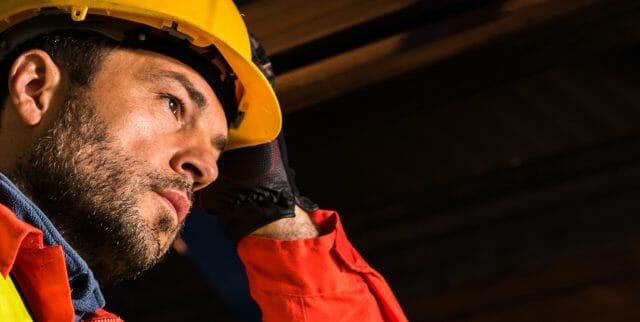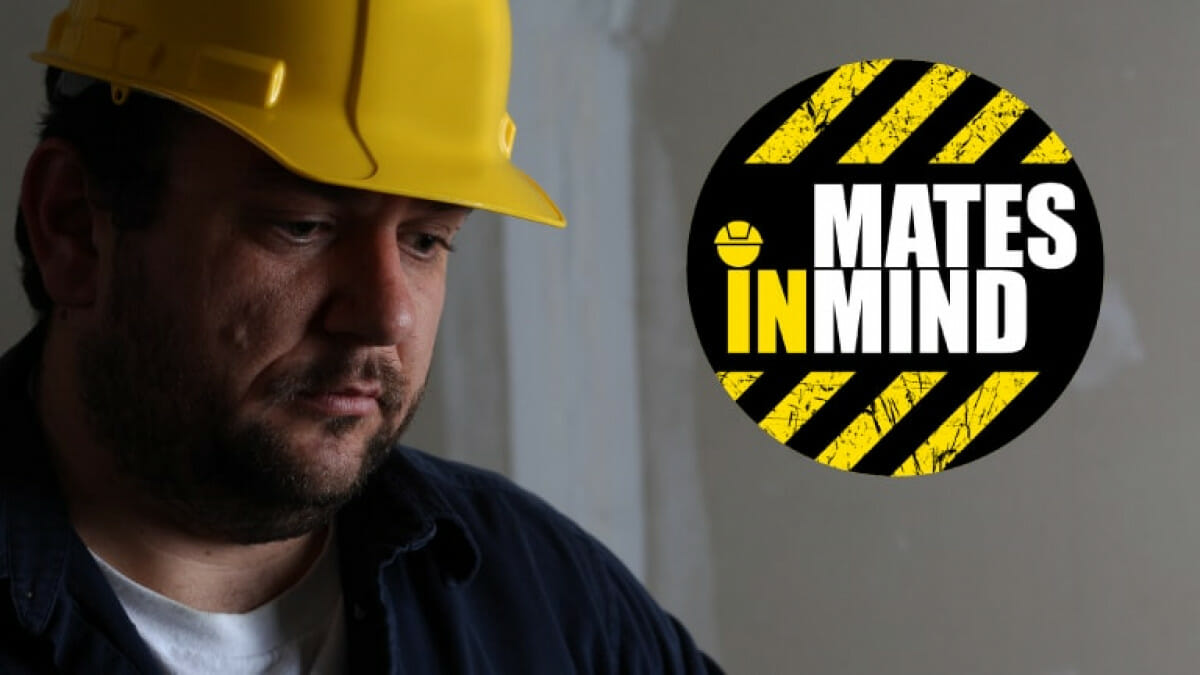
The third Monday in January is now commonly believed to be the most depressing day of the year. Construction industry workers are particularly vulnerable to the post-Christmas slump, exposed as they are on site to the dark and increasingly poor weather. However, poor mental health can potentially be a hazard on site. With machinery being operated, and risks being continually assessed, you want to be comfortable that your colleagues are switched on to the task at hand, and not mentally in a place that affects their ability to do their job. Bottling up feelings and putting on a brave face could unknowingly put others at risk in such safety critical environments.
Mental health is therefore an important component of any health and safety overview of site risks. However, the construction and engineering industries can be hard nuts to crack in terms of implementing employee wellbeing plans. The industries are still male-dominated, as are the sites themselves. This can lead to a corporate culture of keeping feelings buttoned up, leading to workers of either sex receiving the subliminal communication that it’s unacceptable to tell colleagues they are having a bad day, or month, or year. Our own internal analysis shows that men tend to take much longer than women to come forward to share a mental health problem, and this typically means that the problem is much more serious and advanced before help can be given.

However, it’s short-sighted and potentially damaging for both employers and employees if companies take the attitude that if an employee can’t cope they’d be better off leaving their job, or not taking promotion, so that someone who ‘can handle it’ can step up. There’s recently been a move to address this in the construction industry with the initiative Mates In Mind, which aims to address the stigma of poor mental health and improve positive mental wellbeing in the UK construction industry. It’s industry-led in partnership with the Health in Construction Leadership Group, British Safety Council, and several charities.

Such wellbeing initiatives encourage and enable employees to communicate with colleagues, managers and human resources departments if they are feeling stressed or depressed, without fear of stigmatisation or negative repercussions on their careers. They also let workers know that there is access available to support services such as counselling and confidential helplines.
We have all heard the statistics: one in four people will suffer from mental health problems. However, the reality is that everyone will at some point see their mental health take a dip, so it would be more accurate to say that everybody will suffer from mental health problems. Ignoring this fact can lead to high turnover of staff, loss of expertise, a demotivated workforce and in extreme cases, reliance on prescribed medication which all could have been avoided if employees felt supported in the workplace.
Companies shouldn’t be complacent and equate low levels of absenteeism with good mental health across the organisation. Being able to ask for leave when suffering from mental health issues can be a positive sign of a healthy corporate culture. Conversely, low levels of absenteeism can be indicative of a culture where people are afraid to take time off when needed, and may mask serious underlying problems.
Staff in the construction industry are doubly vulnerable to mental health problems. Those in desk jobs, and senior onsite staff who spend some of their working time being responsive online, face the increasing pressures placed on all workforces by the digital age: out of hours emails and an overload of information to process and respond to. Other industries are also feeling this pressure. This month [January] the new chair of the Bar Council said that barrister ought not to feel obliged to reply to emails outside working hours, and called for a halt to work emails being sent in the middle of the night, saying this was damaging to family life and wellbeing.
There are also particular mental health issues in the construction industry. Construction workers are also often away from home, cut off from the distractions and support of their families, and mental health problems can worsen in such an environment.

However, there is a great deal of work that can be done to create a corporate culture where mental health is discussed openly, and where people know that support is available and that they won’t be judged for asking for it. For example, at RSK we have a longstanding corporate tradition that each formal meeting start with a ‘safety moment’ in which people share health and safety issues that they’ve encountered. More recently, as a result of internal initiatives focused on mental health, we have encouraged colleagues to use the safety moment’ as an opportunity to talk about mental wellbeing and any pressures they’re experiencing.
To support this, we participated in the charity MIND’s #AskTwice initiative, which is part of MIND’s Time to Change campaign. This initiative encourages employees to ask their co-workers twice a day how they’re feeling. This can be a challenge for some in the ‘hard hats/hard hearts’ culture, but it’s proving really helpful to many. We also used one of MIND’s campaign videos in our ‘safety moments’, to highlight mental health issues. In addition, we have appointed 40 ‘wellbeing champions’ to promote all aspects of wellbeing.
One challenge for us has been to communicate mental health messages to site workers who may not be accessing technology during working hours. We’re currently working to find ways to make these messages subliminal and part of everyday working life. We want mental health awareness to be part of our everyday working culture, and not just focussed on one off campaigns.
We want colleagues who are close to a person who may be suffering from mental health issues to feel able to encourage that person to speak out and ask for help. A combined approach to supporting somebody with mental health issues –input from colleagues, HR, managers and external counsellors – is proven to work well. Sometimes just feeling able to speak out can be a weight off the mind of somebody who is suffering, and help take the pressure off them. Knowing that they are able to ask for some time off work to deal with the mental health issues can often, paradoxically, make workers feel able to continue in their jobs.
Though we’re still at the early stages of implementing these changes, we’re already seeing our staff becoming more comfortable with talking about their mental health. We’ve had situations where people have shared personal mental health issues on conference calls with colleagues who they’ve never even met. We’ve also had situations where employees have emailing their entire team saying that they’re suffering from mental health issues, only to be themselves overwhelmed in turn by other people on their team coming forward to share similar issues and offer support.
However, corporate responsibility for mental wellbeing cannot be purely focused internally. A company also needs to be able to stand up for staff, by protecting them from being placed under unreasonable pressure by external clients. Every company that undertakes contracting knows that some clients and projects are delightful and some are more difficult to manage. In the latter case, the warning signs of difficulty can be apparent at an early stage, and preventable. It’s important when risk-assessing a project to assess the likelihood of a project posing mental health and wellbeing threats to your workforce. If there are issues on a project such as the inexperience of the person in charge, no clear lines of communication, or frequent changes of deadlines, action needs to be taken to reduce the impact of this on the project team.

Zoe Brunswick is the HR director at engineering and environmental consultancy RSK. Information about MIND’s Time to Change initiative can be found at https://www.time-to-change.org.uk/get-involved/get-your-workplace-involved. Information about Mates in Mind can be found at https://www.matesinmind.org
